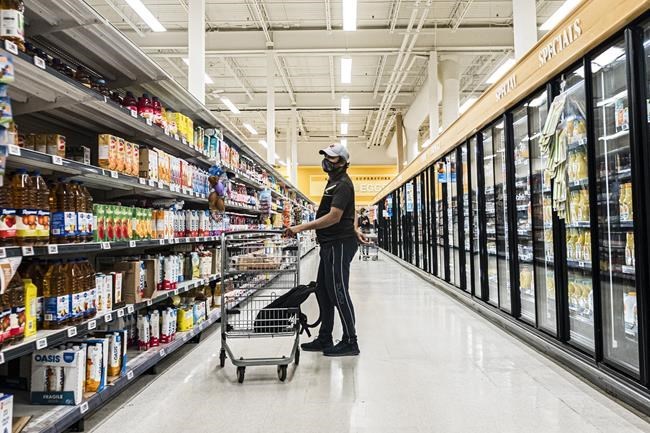
People wearing masks shop at a grocery store in Moncton, N.B., on Wednesday, September, 22, 2021. Online grocery orders surged during the pandemic as Canadians heeded public health warnings to limit outings. As stores quickly ramped up online grocery and delivery services, shoppers largely tolerated product substitutions and mishaps.THE CANADIAN PRESS/Christopher Katsarov
April 24, 2022 - 7:00 AM
HALIFAX - Anjali Rego doesn’t mind some online grocery order substitutions. Swap out regular tomatoes for cherry tomatoes? No problem.
But other changes irk her. Switch regular meat for a plant-based substitute? No way.
“I don’t mind if you give me a different kind of tomato. But don’t goof up my meat,” says the Mississauga, Ont., resident.
“And if I order one per cent milk, don’t give me two per cent.”
Online grocery orders surged during the pandemic as Canadians heeded public health warnings to limit outings. As stores quickly ramped up online grocery and delivery services, shoppers largely tolerated odd product substitutions and mishaps.
But consumers are becoming increasingly impatient with online grocer order errors, experts say.
Stores that don’t improve online grocery blunders could lose sales — especially as supply chain snarls and a sixth wave of COVID-19 could see the need for substitutions rise, they say.
“In online grocery, customer experience is all about how you fulfil the order,” says Frank Kouretas, chief product officer at Orckestra.
Get it wrong and new customers may avoid shopping for groceries online again, while veteran online food shoppers may switch stores, he says.
“From a customer's perspective, it's hard to understand why a store got it wrong,” Kouretas says. “And it's easy to get it wrong without the right technology in place.”
Orckestra, an e-commerce solutions provider from MDF Commerce Inc. based in Longueuil, Que., has developed a technical solution to address the problem of grocery substitutions.
“Substitutions are unique to grocery,” Kouretas says. “Sports Experts won’t substitute my (Nike) Air Force 1’s for Adidas — they either have them in stock or they don’t.
“But in grocery you have volatile inventory and substitutions happen … this is why you hear horror stories about substitutions.”
Tales of online grocery order substitutions have taken on near-urban legend status: Ground beef instead of tofu, candles instead of light bulbs, flour instead of gluten free baking mix, multiple heads of Napa cabbage instead of baby bok choy.
Others involve mixed up quantities, such as 10 kilograms of bananas rather than 10 bananas, or more mundane but nevertheless irritating swaps like fresh oregano instead of fresh cilantro.
"The decision on how to substitute is complex and highly personal to each customer,” Srini Venkatesan, executive vice-president of Walmart Global Tech, said in a blog post last June.
Take a store that’s run out of cherry yogurt, for example. Whether to choose another fruit flavour, like strawberry or blueberry, or opt instead for plain or a different brand altogether is not a simple choice and can vary from customer to customer.
“There are nearly 100 different factors that can go into that decision,” Venkatesan says in his blog post. “Trying to account for all of these would not only be too difficult, but it would also be incredibly time consuming.
“If the wrong choice is made, it can negatively impact customer satisfaction and increase costs.”
Most stores allow customers to choose whether or not to allow substitutions. But the default is usually set to allow substitutions and changing it can be cumbersome.
Stores refund an item if a customer is not satisfied with a substitution, but the hassle of requesting the refund for customers and the loss of a potential sale for stores makes it a lose-lose solution.
The situation has prompted some retailers to turn to technology and artificial intelligence to help personal shoppers, sometimes called packers or pickers, make the right choice for customers and eliminate the guesswork
Orckestra, for example, has developed what Kouretas calls an “order picking application.”
“It provides the right feedback to make sure that the person picking the orders doesn't make mistakes,” he says.
Technology can improve both online grocery order substitutions and customer satisfaction, especially when it’s tailored to the retailer, Kouretas says.
Orckestra works with big grocers like IGA and Aldi, a German discount supermarket chain, to improve their online grocery ordering and picking system.
Kouretas says employee training is also critical.
“I can't stress enough the importance of training,” he says. “Having trained employees who know the store, who know the products and who understand how to substitute products will improve outcomes.”
This report by The Canadian Press was first published April 24, 2022.
Companies in this story: (TSX:MDF)
News from © The Canadian Press, 2022